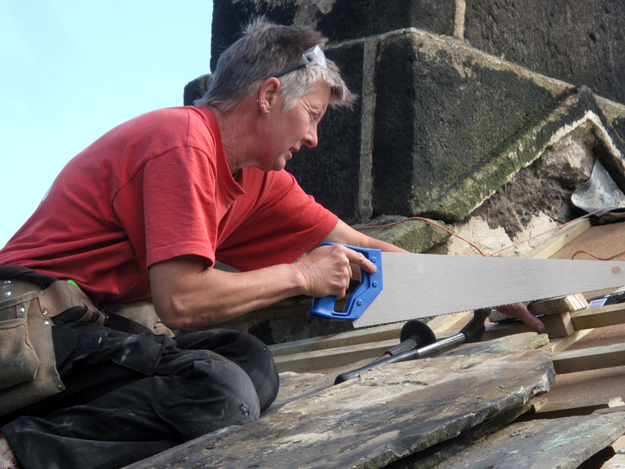I realised early on that I loved practical work but was hampered by having no role models, and no opportunities for training, being a woman, so I started out in childcare – how typical! Nevertheless, I have been very lucky in my life to have been given amazing opportunities that I have been able to say yes to, and I’ve ended up running my own company, remaining principled about my work, and really enjoying what I do.
I trained as a carpenter and joiner a long time ago, and specialised in roofing because I loved it the most (challenging, a bit dangerous, lovely views), starting Amazon Nails, a women’s roofing company, in 1989. Then I discovered strawbale building in 1994 and knew I had found my true path. Everything I tried to do: learn, gain experience, make contacts, was easy and I was encouraged to share my passion even though I was laughed at a lot in the early days. I truly believe I had found a way for ordinary people to get involved in building again, through simple techniques and affordable methods.
By 2007 it seemed time for a different type of structure, and the business became a social enterprise called amazonails ltd. In this manifestation we achieved a lot, and working with much the same design team as I am now we designed affordable strawbale council houses, the largest loadbearing straw building in the UK and designed, built and trained on many other projects. I’ve lost count of how many strawbale buildings I’ve worked on, but it has to be over 300 by now.
Amazonails closed in July 2011, and this has given me the opportunity to get back to my roots, and to do more practical work, both roofing and teaching, that I have missed in the last few years. Teaching is one of the skills I was delighted to find I was good at, since I really enjoy it, and it’s the best way to pass on knowledge and enthusiasm on a building site.
Straw Works gives me the opportunity to continue designing great houses and buildings, work on roofs, teach on real buildings and work part time. It’s too easy to lose sight of what’s important in life – living and loving, giving and growing.
What others say about Barbara:
Barbara has achieved a lot in her career in construction, and been honoured for it. She was elected a Fellow of the Royal Society of Arts, manufacturing and commerce (FRSA) in 2009. She was awarded a Lifetime Achievement Award from Women in Construction in 2011 and received a Woman of Outstanding Achievement Award from UKRC in 2009.
She is very principled about using natural materials for building, and insists on designs that are simple and straight forward, often using unusual materials or techniques that have found her arguing with engineers and Building Inspectors on many occasions! She often says that she has worked with lots of engineers, but most of them only once, as she demands respect, an ability to discuss ideas and methods that are out of the ordinary, and a fearlessness that matches her own. Questioning why we do things the way we do, and learning from the architectural heritage we find around us every day have been her hallmarks.
This approach has produced not only simplified strawbale building techniques, but foundation designs using car tyres, shallow foundations, flexible and self-draining foundations, none of which require cement, and although all legal and approved, none of which are mentioned in UK Building Regulations. She has been and remains a great teacher and innovator; passionate, tenacious and enquiring. Her teaching style was described recently : “I aim to channel the Barbara Jones style of teaching – that is, be clear, be kind, and empower people to use their own common sense and intuitive knowledge to do what they surely can”.
Barbara was part of Sisterhood and After: an oral history of the Women’s Liberation Movement, a project by the British Library and Sussex University to record the experiences of 60 women who were active in the Women’s Liberation Movement.
